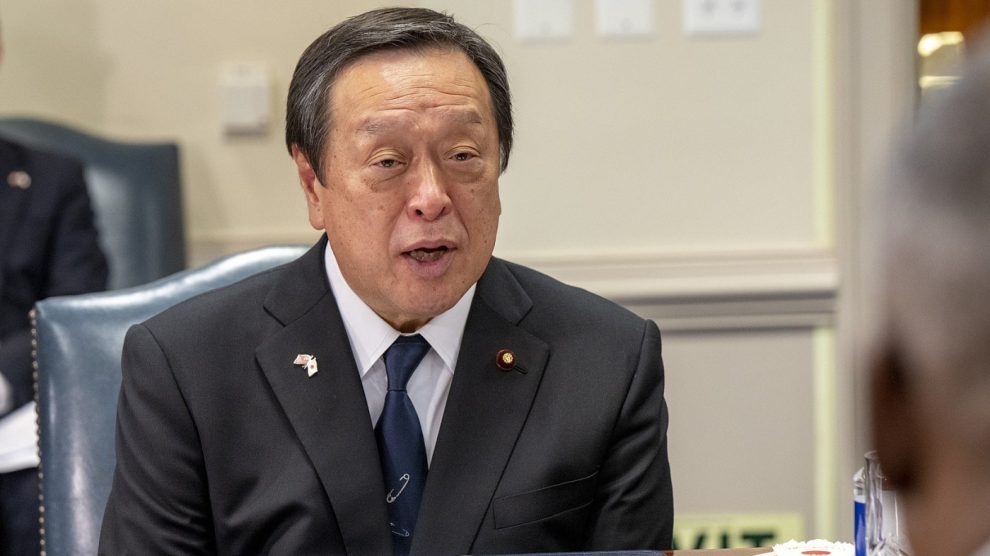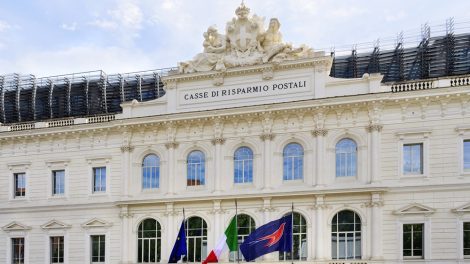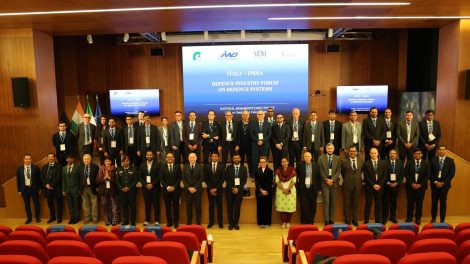The following are excerpts from our interview with Defence Minister Yasukazu Hamada. Find the full text below.
On Tokyo, Rome and London’s strengthening ties. Japan expects cooperation with Italy and the United Kingdom on the Global Combat Air Programme to “promote innovation in the Japanese economy as a whole and contribute to peace and stability in the Indo-Pacific and European regions.”
- In the coming weeks, the Italian and British Defence Ministers will visit Japan for a three-way ministerial meeting. “It is significant that the ministers of Japan, Italy and the United Kingdom confirm these points and move towards further cooperation,” said Minister Hamada.
On political and military talks. “In the field of defence, Japan and Italy will strengthen cooperation, including through the political-military talks we decided to hold at the recent summit meeting and the joint development of the future fighter aircraft with the UK announced last December.”
- In early January, Italian Prime Minister Giorgia Meloni and her Japanese counterpart Fumio Kishida elevated the bilateral relations to a “strategic partnership”.
On Italian efforts in the Indo-Pacific. “Security in Europe and the Indo-Pacific are closely related, and Japan welcomes the growing interest of European countries in the region. Japan is very supportive of Italy and other European countries sending ships and aircraft to the Indo-Pacific, as this contributes to peace and stability. We hope to seize this opportunity to expand the possibilities for further joint training between military units of various countries and [Japan’s Maritime] Self-Defence Forces.”
- Recently, the Italian Navy’s Chief of Staff told us that the offshore patrol vessel Morosini will train alongside allies and friendly navies in the Indo-Pacific.
The relationship between Italy and Japan is in full expansion. In early January, Italian Prime Minister Giorgia Meloni and her Japanese counterpart Fumio Kishida upgraded their countries’ bilateral relations to a “strategic partnership”. A month earlier, the two and their British counterpart Rishi Sunak had signed a cooperation agreement to build a sixth-generation fighter jet, known as Global Combat Air Programme, integrating the Anglo-Italian Tempest and the Japanese F-X. And at the Pontignano Forum in Rome, British Defence Minister Ben Wallace announced he would be travelling to Tokyo in March, together with his Italian counterpart Guido Crosetto, to meet their Japanese colleague Yasukazu Hamada – whom we spoke to.
Minister Hamada, what does the new strategic partnership between Italy and Japan mean for the defence sector?
Japan and Italy are both members of the G7, share core values and are responsible for leading the international community. Together, the countries agreed to upgrade the relationship to a “strategic partnership” at the recent summit meeting on January 10. We look forward to collaborating on bilateral cooperation and international challenges. In the defence field, Japan and Italy will strengthen cooperation, including through the military-political talks we agreed to hold at the recent summit meeting and the joint development of the future combat aircraft with the UK we announced last December.
What are the prospects for the Rome-Tokyo bilateral relations?
Japan and Italy have developed cooperation at the operational level, such as the joint development of next-generation combat aircraft and the joint anti-piracy exercise between the Italian Navy and Japan’s Maritime Self-Defence Force. In addition, the capitals have had defence exchanges at various levels, including high-level dialogues, such as the Japan-Italy ministerial meeting in April 2022, the Italian Air Force Chief of Staff’s visit to Japan with some 100 cadets from the Air Force Academy, the defence exchange between the two air refuelling squadrons, and a teleconference with Italian Defence Minister [Guido] Crosetto. We will continue bilateral defence cooperation and exchanges.
Do you expect an Italian naval presence in the Indo-Pacific? The Morosini offshore patrol vessel will soon be training with allies and friendly navies in the Indo-Pacific, as Admiral Enrico Credendino, the Italian Navy’s chief of Staff, told us.
Security in Europe and the Indo-Pacific are closely related, and Japan welcomes the growing interest of European countries in the region. Japan is very supportive of Italy and other European countries sending ships and aircraft to the Indo-Pacific, as this contributes to the region’s peace and stability. We hope to seize this opportunity to expand the possibilities for further joint training between military units of various countries and [Japan’s Maritime] Self-Defence Forces.
What prompted Japan to join the GCAP with Italy and the UK?
When we were dealing with joint development, it was important that each country had the same planned in-service date and its own development programme for international cooperation. In this regard, Japan, the UK and Italy had their own programme for developing a next-generation combat aircraft by 2035. Moreover, this joint development will enable the three countries to share the technological advantages, expertise and development costs to jointly design an advanced fighter aircraft that will ensure air superiority in the future, maintain and strengthen the defence industrial base by increasing the number of produced aircraft, create the next generation of internationally-recognised engineers, and lay the foundations for broader collaboration between Japan, the UK and Italy. These countries share core values and are allies of the United States; they are also vital contributors to the stability of the Indo-Pacific and European regions in an increasingly complex security environment. These elements were taken into account when deciding on this trilateral joint development.
What are the horizons for cooperation between the three countries?
The joint development of next-generation combat aircraft aims to develop a fighter jet that will have air superiority in the coming decades, integrating the technologies of Japan, Italy and the UK and sharing the costs, for example. Last December, the leaders of Japan, Italy and the UK announced in the Joint Leaders’ Statement that the GCAP would accelerate our advanced military capabilities and technological potential, deepening defence cooperation, scientific and technological collaboration, integrated supply chains, and further strengthening our defence industrial base. The Ministry of Defence and the Japan Self-Defence Forces anticipate that GCAP cooperation will promote innovation in the Japanese economy as a whole, contribute to peace and stability in the Indo-Pacific and European regions, and further promote defence cooperation and exchanges together with Italy and the UK, to maintain and strengthen the “free and open Indo-Pacific” and security in the region.
What do you expect from the upcoming meeting with your Italian and British counterparts, Ministers Guido Crosetto and Ben Wallace?
As for the meeting between the defence ministers of Japan, Italy and the UK, the details have yet to be decided for the time being. As mentioned, GCAP cooperation is expected to promote innovation in the Japanese economy as a whole and contribute to peace and stability in the Indo-Pacific and European regions. It is significant that the ministers of Japan, Italy and the UK confirm these points and move towards further cooperation.
What are Japan’s defence priorities with regard to Europe?
Japan formulated its “National Security Strategy”, “National Defence Strategy,” and “Defence Enhancement Programme” in December 2022. These documents specify that Japan will maintain and strengthen the free and open international order by further improving its deterrence and response capabilities with neighbouring countries and strengthening its defence capabilities. Based on these concepts, the “National Defence Strategy” sets out the cooperation policy that will mutually enhance involvement in global security issues and challenges in Europe and the Indo-Pacific, with partners such as Italy, the UK, France and Germany. Accordingly, Japan will build close cooperation with European countries through consultations such as the “2+2,” bilateral/multilateral training and exercises, as well as defence equipment and technology cooperation, including the joint development of next-generation combat aircraft and the reciprocal dispatch of ships and planes.
With regard to the policy concerning NATO and the European Union, the “National Defence Strategy” states that, based on bilateral relations with the aforementioned European countries, Japan will strengthen cooperation in international rule-making and involvement in the security of the Indo-Pacific region. In addition, Japan will strengthen cooperation with the Nordic-Baltic States, which are facing unilateral changes to the status quo by force and attempts of this kind, including Russia’s aggression against Ukraine, and are working on several important challenges such as information warfare, cybersecurity, strategic communication and hybrid warfare. Japan will also strengthen cooperation with Central and Eastern European countries, including the Czech Republic and Poland, which are showing interest in strengthening their relations with Japan.
Has the war in Ukraine provided useful lessons for Taiwan’s defence?
The Ministry of Defence refrains from giving a definitive answer on the influence of Russian aggression on Ukraine. With this in mind, Taiwan announced that, in light of that aggression, it had strengthened military training for reservists and conducted Javelin anti-tank and air defence training in which every citizen participated during the regular large-scale exercise. Furthermore, it was emphasised that China has become cautious about using force against Taiwan because Russia has faced strong resistance from Ukraine and strong sanctions implemented by the united international community. In any case, the Ministry of Defence continues to monitor trends closely.





